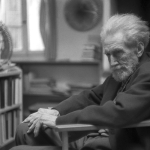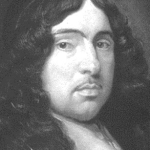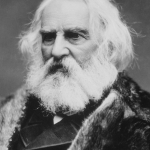We passed old farmer Boothby in the field.
Rugged and straight he stood; his body steeled
With stubbornness and age. We met his eyes
That never flinched or turned to compromise,
And “Luck,” he cried, “good luck!”—and waved an arm,
Knotted and sailor-like, such as no farm
In all of Maine could boast of; and away
He turned again to pitch his new-cut hay...
We walked on leisurely until a bend
Showed him once more, now working toward the end
Of one great path; wearing his eighty years
Like banners lifted in a wind of cheers.
Then we turned off abruptly—took the road
Cutting the village, the one with the commanding
View of the river. And we strode
More briskly now to the long pier that showed
Where the frail boats were kept at indian Landing.
In the canoe we stepped; our paddles dipped
Leisurely downwards, and the slim bark slipped
More on than in the water. Smoothly then
We shot its nose against the rippling current,
Feeling the rising river’s half-deterrent
Pull on the paddle as we turned the blade
To keep from swerving round; while we delayed
To watch the curious wave-eaten locks;
Or pass, with lazy turns, the picnic-rocks....
Blue eels flew under us, and fishes darted
A thousand ways; the once broad channel shrunk.
And over us the wise and noble-hearted
Twilight leaned down; the sunset mists were parted,—
And we, with thoughts on tiptoe, slunk
Down the green, twisting alleys of the Kennebunk,
Motionless in the meadows
The trees, the rocks, the cows...
And quiet dripped from the shadows
Like rain from heavy boughs.
The tree-toads started ringing
Their ceaseless silver bells;
A land-locked breeze came swinging
Its censer of earthy smells.
The river’s tiny cañon
Stretched into dusky lands;
Like a dark and silent companion
Evening held out her hands.
Hushed were the dawn’s bravados;
Loud noon was a silenced cry—
And quiet slipped from the shadows
As stars slip out of the sky...
It must have been an hour more, or later,
When, tramping homeward through the piney wood,
We felt the years fly back; the brotherhood
Of forests took us—and we saw the satyr!
There in a pool, up to his neck, he stood
And grinned to see us stare, incredulous—
Feeling the menace in the crafty night,
We turned to run—when lo, he called to us!
Using our very names he called. We drew
With creaking courage down the avenue
Of birches till we saw, with clearing sight,
(No longer through a tricky, pale-green light)
Familiar turns and shrubs, the friendly path,—
And Farmer Boothby in his woodland bath!
The woods became his background; every tree
Seemed part of him, and stood erect, and shared
The beauty of that gnarled serenity;
The quiet vigor of age that smiled and squared
Its shoulders against time ... And even night
Flowed in and out of him, as though content
With such a native element;
happy to move about a spirit quite
As old, as placid and as confident...
Sideways we turned. Still glistening and unclad
He leaped up on the bank, light as a lad,
His body in the moonlight dripping stars...
We went on homeward, through the pasture-bars.



















Comment form: